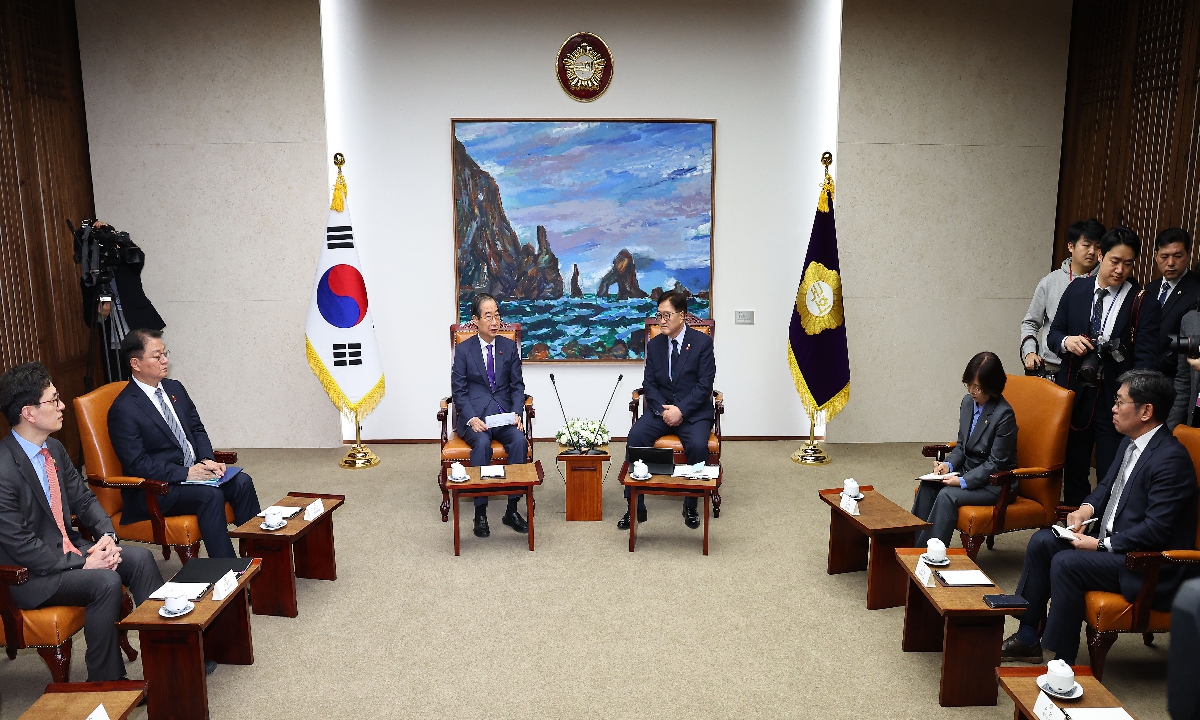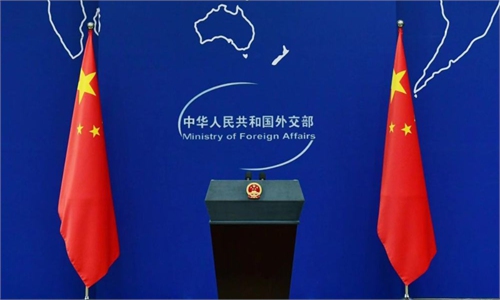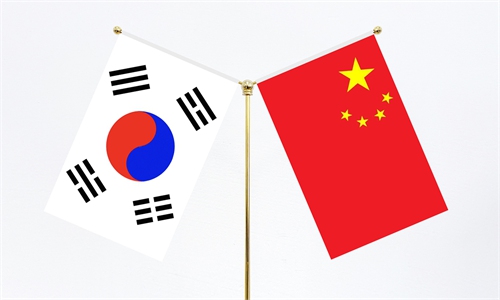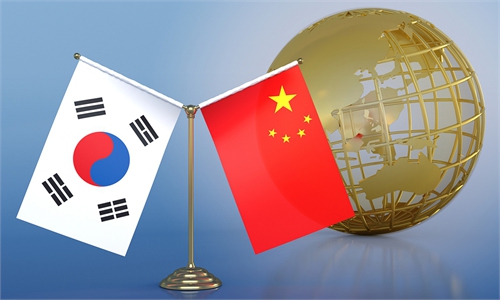South Korea strives to address domestic, diplomatic perils after Yoon’s impeachment motion passage
Political battle between ruling and opposition parties remains unresolved

South Korean Acting President Han Duck-soo met with the speaker of the National Assembly on December 15, 2024. Photo: VCG
One day after the impeachment motion against South Korean President Yoon Suk-yeol was passed, the ruling party of South Korea is striving to stabilize domestic politics while the government is making efforts to minimize the diplomatic implication caused by the martial law turmoil.South Korean Acting President Han Duck-soo met with the speaker of the National Assembly on Sunday, a day after the National Assembly voted to impeach President Yoon Suk-yeol over his failed bid to impose martial law on December 3. Speaker Woo Won-shik urged Han for the government and the parliament to work together to overcome the political turmoil after President Yoon Suk-yeol was impeached, Yonhap News Agency reported.
Han said the government will make all of its decisions based on the Constitution, the law and the future of the country, and vowed a "swift" resolution of the current situation, according to his office.
On the same day, South Korean Finance Minister Choi Sang-mok said he would actively communicate with the National Assembly to help calm financial markets and maintain economic stability. Choi made the remarks during a meeting with economy-related ministers earlier in the day.
Local media also reported Sunday, Korean prosecutors said President Yoon did not comply with their summons for Sunday and added they will soon issue another order.
Diplomatic efforts
As domestic political turmoil continues to evolve, Seoul is also making efforts to address its diplomatic disturbance triggered by Yoon's short-lived martial law, including reaffirming alliance with the US and ties with China, in an effort to stabilize its most significant diplomatic framework.
Acting President Han reportedly held phone talks with US President Joe Biden on Sunday and vowed to maintain and develop the two countries' alliances. During the 16-minute phone conversation, it is reported that Biden said that he will continue to work together with the South Korean side for the development and strengthening of the South Korea-US alliance and South Korea-US-Japan cooperation.
Lü Chao, an expert on the Korean Peninsula issue at the Liaoning Academy of Social Sciences, said the phone call with Biden was an attempt by the acting president to test and gauge the state of US-South Korea relations following the domestic political chaos, especially after Yoon declared the martial law without informing its most significant ally in advance, which created challenges to ties.
The current political turmoil has certainly shaken the country's confidence and ability to cope with external uncertainties in the near term, Zhan Debin, the director and professor of the Center for Korean Peninsula Studies at the Shanghai University of International Business and Economics, told the Global Times.
Immediately following the impeachment motion against President Yoon was passed on Saturday, Seoul's senior diplomats held high-level talks with envoys of the US, Japan and China to explain South Korea's domestic political development, including the passage of the impeachment motion against Yoon, and highlighted Seoul's resolve to sustain diplomatic momentum and strengthen ties with key partners, South Korean media reported on Saturday.
Yonhap reported on Saturday that Deputy Foreign Minister Chung Byung-won met with Fang Kun, charge d'affaires ad interim of the Chinese Embassy in Seoul and assured that Seoul will continue to work toward enhancing the strategic cooperative partnership with Beijing. The two sides agreed to maintain close communication and work together to enhance bilateral economic cooperation and people-to-people exchanges.
Relations between China and South Korea experienced drastic downfall since Yoon took office, and the key reason is that he has made provocative statements on the Taiwan question which has seriously challenged China's red line. But after that, Yoon also attempted to fix the ties with China as he realized that it's bad for his country to have a worsening relationship with a major power and key trading partner in the region, experts said.
Amid the impeachment crisis, Yoon in his televised address on Thursday referred to China offensively several times, including claiming that "Chinese solar power facilities will destroy forests nationwide." Chinese Foreign Ministry spokesperson called the comments "deeply upsetting." Later on Friday, the South Korean Ministry of Foreign Affairs made comments stating that South Korea will continue to develop bilateral relations with China and maintain necessary communication despite recent domestic developments following Yoon's comments on China.
Lü noted that "The political situation in South Korea is currently in a critical period, and the fact that emerges in this moment is that, for South Korea, the relationships with both the United States and China are both crucial and need to be carefully managed, and this is a political reality that any politician who takes power in South Korea must recognize."
The reason why the South Korean government pressingly made explanation to China is that South Korea attaches great importance to its ties with China. South Korean officials who are in charge now don't want Yoon's recent inappropriate remarks about China to have a negative impact and further damage on the bilateral relations, the expert said.
After the impeachment
Yoon was suspended from his presidential duties on Saturday as his office received the impeachment declaration following its passage at the national assembly, Yonhap reported on Saturday.
Lee Jae-myung, the leader of the main opposition Democratic Party (DP), on Sunday called for the Constitutional Court to take "swift" steps for Yoon's dismissal, saying it is the only way to "minimize the country's chaos." The court has 180 days to decide whether to approve the parliament's decision that will either remove Yoon from office or have him reinstated, Yonhap reported.
Lee also proposed forming a consultative body between the parliament and the government to stabilize state affairs, while saying he would not take steps for the impeachment of Prime Minister Han Duck-soo. The People Power Party (PPP), however, rejected Lee's proposal, noting it remains the ruling party.
The political battle between the ruling and opposition parties in South Korea remains unresolved, with Lee Jae-myung pressing forward, aiming for a swift resolution to the impeachment case and an early election, while the internal divisions within the ruling People Power Party are becoming apparent, potentially impacting Han's acting presidency and Han Dong-hoon's leadership of the party.
Meanwhile, various speculations surrounding the motivation behind Yoon's declaration of martial law continue to emerge.
The Korea Herald reported on Saturday that Kim Ou-joon, who was a popular host of the News Factory radio show at Seoul city-owned Traffic Broadcasting System and now hosts a YouTube show, claimed that -- based on the information at hand that had yet to be fact-checked -- the troops had attempted to assassinate ruling party leader Han Dong-hoon. He also claimed that the plot included attacking and killing US troops and placing the blame on North Korea, he claimed.
The ruling People Power Party and the government, however, denied Kim Ou-joon's claim.




